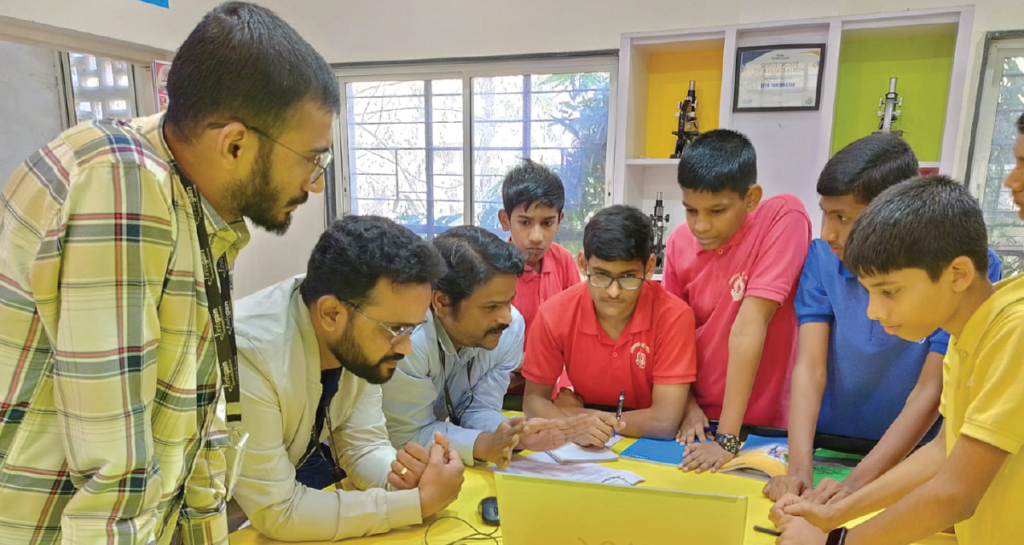AI and robotics are essential links to our future. Their influence extends beyond improving accessibility and customizing care within healthcare systems to transforming our living environments through smart home technology. Squeezing the most out of these technological advances requires striking a healthy balance between autonomy and human interaction. AI’s capacity to interpret user preferences via algorithms enables customized support, meeting individual needs without requiring ongoing personal outreach. The India STEM Foundation embraces new technology and promotes automating labor-intensive tasks, cutting down on labor expenses, and enabling people to concentrate on developing their skills in a constantly changing environment.
By examining large datasets, finding trends, and deriving insights, artificial intelligence (AI) obtains information. By automating processes and offering data-driven recommendations, it improves human decision-making. But AI doesn’t produce new knowledge; instead, it uses data that already exists to provide insightful, productivity-enhancing analysis and solutions that benefit people.
The India STEM Foundation is committed to transforming our society into an AI-assisted ecosystem. Focused on raising awareness about the value of technology, its mission revolves around inspiring the next generation to become 21st-century innovators and problem solvers. Through programs like Gyanodya, Anusikshan, Robo Siksha Kendra, and Savrachna, the Foundation empowers individuals to embrace and excel in the world of STEM.
The Impact of AI on Daily Life
Artificial Intelligence (AI) is at the forefront of modern technology, changing many facets of our daily lives. Its all-pervasive influence is evident in everything from revolutionizing industries to streamlining mundane routines. A Revolution Taking Shape In essence, artificial intelligence mirrors human intelligence in machines, allowing them to perform jobs that previously required cognitive talents from humans. Its integration transforms routines and makes tasks more precise, touching many aspects of daily life. Artificial Intelligence in Everyday Tasks The widespread use of smart devices is evidence of AI’s pervasiveness in daily life. A few instances of artificial intelligence (AI) blending into our daily lives are voice-activated assistants, personalized recommendation engines, and predictive text algorithms.
Communication systems use AI to translate languages in real time, removing linguistic barriers across borders and promoting smooth communication.
AI is revolutionizing the workplace
A number of industries are undergoing radical change as a result of AI’s capacity to automate procedures. Tasks that were previously completed by hand are being performed by AI-driven systems with increasing proficiency in the industrial, logistics, and service sectors. In addition to altering the nature of employment, this shift calls for a growth in skill sets and creates new chances for specialized roles. One industry where AI is already transforming occupations and working in real-time is customer service. Numerous companies have included AI-powered chatbots into their customer support systems. These chatbots’ ability to understand natural language allows them to respond to customer requests immediately.
Large datasets are analyzed by AI systems to find trends, patterns, and connections. It collects data using techniques including natural language processing, data mining, and machine learning, which allow it to analyze and interpret information from a variety of sources. By providing data-driven insights, automating tedious processes, and producing precise forecasts, artificial intelligence (AI) improves human skills. It helps people by enhancing their productivity, judgment, and problem-solving skills. AI, however, synthesizes and analyzes already-existing data to produce insightful recommendations and solutions—it does not create new information. This enables people to concentrate on difficult and creative tasks and make more informed decisions.
Enhancing Health and Well-Being
AI is revolutionizing diagnosis and treatment in the healthcare industry and is having a significant influence. Machine learning algorithms are critical for early disease detection, personalized treatment plans, and empowering individuals to manage their own health. Personal wellness is also addressed by AI-powered health applications, which offer tracking capabilities and personalized advice.
Ethics Concerning Artificial Intelligence
The more AI is integrated, the more important ethical issues arise. Issues pertaining to algorithmic bias, fairness, and data privacy emerge, underscoring the necessity of strong regulatory frameworks. In this rapidly changing technological environment, protecting data privacy and guaranteeing justice in AI-driven choices become crucial requirements.
Future Applications of AI in Daily Life
Artificial intelligence (AI) will change how we live and work in the future by blending itself into daily life. Artificial intelligence will be used in smart homes to improve security, streamline daily chores, and maximize energy use. Schedule management, product recommendations, and real-time information catered to personal tastes will all be handled by personalized AI assistants. AI-driven diagnosis and individualized treatment regimens will revolutionize healthcare and enhance patient outcomes. Autonomous vehicles and intelligent traffic management will improve transportation by lowering accidents and congestion. AI-driven learning platforms will enable tailored education that meets the demands of each individual student. In general, AI will improve quality of life, convenience, and efficiency in a variety of fields.
In conclusion, robotics and AI are essential to our future since they have enormous advantages in a variety of industries. They improve living conditions, advance healthcare, and increase productivity by automating labor-intensive jobs. Without generating new knowledge, artificial intelligence (AI) excels at analyzing massive information to offer data-driven insights and solutions that improve productivity and decision-making. The India STEM Foundation promotes embracing technology and artificial intelligence to enable people to further their careers in a changing global environment. AI will improve convenience, effectiveness, and quality of life as it becomes more integrated into daily life. This will create a future where technological developments optimize human potential.

